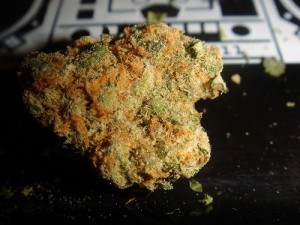 Strawberry cough is a high end strong sativa strain. As implied by its name it has a fruity taste and an aroma reminiscent of fresh strawberries. Many connoisseurs rank it among their favorite strains in terms of flavor enjoyment. As is common with the sativa strains it produces an energetic feeling of well being. Because of the uplifted feeling that it provides Strawberry Cough is often cited as a better choice for daytime use than for nocturnal consumption.
Strawberry cough is a high end strong sativa strain. As implied by its name it has a fruity taste and an aroma reminiscent of fresh strawberries. Many connoisseurs rank it among their favorite strains in terms of flavor enjoyment. As is common with the sativa strains it produces an energetic feeling of well being. Because of the uplifted feeling that it provides Strawberry Cough is often cited as a better choice for daytime use than for nocturnal consumption.
Strawberry Cough is indicated for use in the treatment of anxiety, stress and sometimes pain. Its potent euphoria is known to produce a relaxed but motivated sensation that leaves the user desiring activity and stimulation. This type of euphoria has been associated with beneficial effects on anxiety and stress related disorders. Problems such as attention deficit disorder and posttraumatic stress syndrome have been known to be greatly alleviated by the use of this strain.
It seems that the calming of social anxieties combined with the motivating effects work perfectly to offset the major symptoms of these types of disorders. This is also a primary reason why some don’t recommend Strawberry Cough for use at night. The same effects that calm anxiety and promote activity and social interaction also have a tendency to inhibit sleep. Unlike the sedation produced by an indica, this sativa strain is likely to cause a patient to toss and turn with her mind racing.
While its effects on pain are a bit more ambiguous, many patients reported relief from tension related pain such as back, neck and headache pain. Again these benefits seem to be more prominent in patients who also suffer from anxiety and stress related disorders. It seems that the type of euphoria induced by Strawberry Cough is uniquely suited to address anxiety. The easing of anxiety reduces physical symptoms throughout the entire body. In some cases this includes the alleviation of some pain.
In turn the patient is physically more comfortable and therefore exhibits uncharacteristic motivation toward activity. Along with physical comfort the patient experiences a reduction in emotional distress and is subsequently more at ease in social situations than she would normally be. These effects combine to render the patient much more relaxed and at peace with her surroundings, but energetic and not necessarily ready to lay down and go to sleep.
 Strawberry cough is a high end strong sativa strain. As implied by its name it has a fruity taste and an aroma reminiscent of fresh strawberries. Many connoisseurs rank it among their favorite strains in terms of flavor enjoyment. As is common with the sativa strains it produces an energetic feeling of well being. Because of the uplifted feeling that it provides Strawberry Cough is often cited as a better choice for daytime use than for nocturnal consumption.
Strawberry cough is a high end strong sativa strain. As implied by its name it has a fruity taste and an aroma reminiscent of fresh strawberries. Many connoisseurs rank it among their favorite strains in terms of flavor enjoyment. As is common with the sativa strains it produces an energetic feeling of well being. Because of the uplifted feeling that it provides Strawberry Cough is often cited as a better choice for daytime use than for nocturnal consumption.